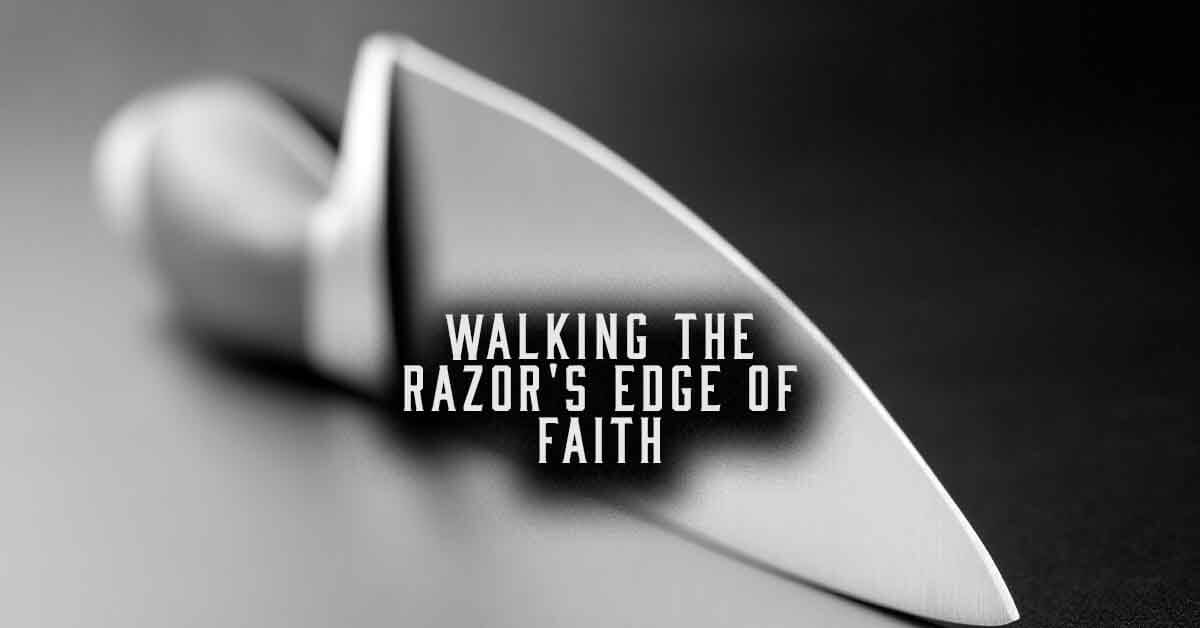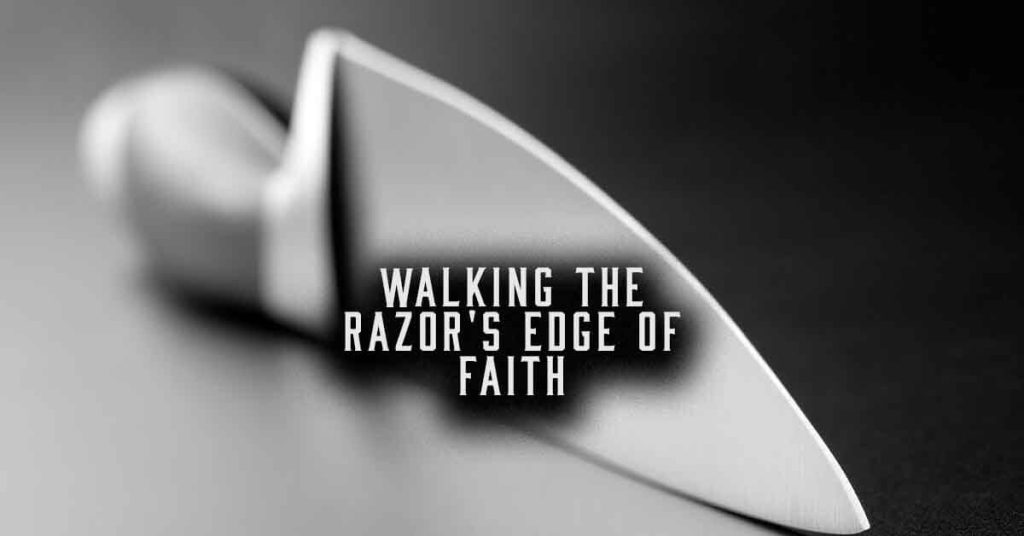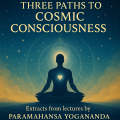
In the sacred teachings of mystics across ages—from the Upanishads to the Psalms, from the whispers of the Tao to the heart of Christ’s message—there is a resounding truth: the path to God is narrow, often described as no wider than the edge of a razor. It is sharp, yes—but also clear, simple, and unwavering for the one whose heart is ablaze with divine love.
The Simplicity and the Trial
Many imagine the spiritual journey as a towering mountain, impassable by the weary and troubled soul. But Paramahansa Yogananda gently reminds us: “The path is simple if one makes up their mind to go all the way for the love of God.” It is not complexity that hinders us, but hesitation. Doubt, the silent thief of spiritual momentum, has led countless seekers astray—not through outright rebellion, but through subtle inner questioning, inertia, and speculation.
Across spiritual traditions, this caution resounds. In the Bhagavad Gita, Lord Krishna warns Arjuna of the wavering mind; in the Bible, James tells us the doubter is “like a wave of the sea, blown and tossed by the wind.” Buddhism teaches that doubt (vicikicchā) is one of the five hindrances to enlightenment.
But doubt, Yogananda teaches, is not insurmountable. It is not the end. When we find ourselves wondering whether God is near, we must anchor ourselves in the presence of one who has known God. For, “the blind cannot lead the blind.” A true guru is not a personality seeker, but a soul ablaze with divine realization.
God Is Not to Be Found—He Is Already Yours
The central revelation of the journey is this: God is not to be acquired, but to be realized. He is not distant, not hidden in the far corners of heaven. He is already yours. As the Prophet Isaiah declared, “Before they call, I will answer; while they are yet speaking, I will hear.”
Why, then, do we feel separate from the Infinite? Because we have clothed our divine nature with moods, doubts, and distractions. We have veiled our eyes with the fabric of delusion.
But every night, as we sleep and forget the world, we momentarily return to our true nature—Spirit. In that formless calm, in the inner quiet, we become what we always are: one with God. The path, then, is not about becoming, but about remembering.

Meditation: The Royal Road to Remembrance
In Christianity, Jesus withdrew often to lonely places to pray. In Buddhism, the Noble Eightfold Path begins with right mindfulness and concentration. In Hinduism, the science of Kriya Yoga—taught by Yogananda—anchors the soul in stillness.
Meditation is not escape; it is the homecoming. It clears the fog and returns our awareness to the Eternal. But Yogananda warns: “It isn’t only meditation that I emphasize. Meditation plus keeping your mind with God during activity is what is necessary.”
In deep meditation, we lose all awareness of ego. And with consistency, the boundary between meditation and activity dissolves—God-consciousness flows into everything. Whether cooking or working, speaking or walking, we remain with the One.
Let No Moods Obscure Your Calmness
One of the most practical and piercing spiritual teachings from Yogananda’s message is this: Guard your calmness like a king guards his castle. Emotions are contagious. Moods are treacherous. They disguise themselves as reality, when in truth, they are clouds passing over the light of your soul.
The Bhagavad Gita speaks of the sthitaprajna—the one of steady wisdom—who remains undisturbed in pleasure or pain, gain or loss. Jesus, too, sat still in the face of storms.
True freedom begins the moment we realize: “All my troubles are grafts on my consciousness—they do not belong to my soul.”
Affirm: “I am a child of God. I am with Him. He is with me.” This is not poetry; it is spiritual science.
Beyond Miracles: The Devotee Seeks Only God
Another danger on the spiritual path is the craving for powers and miracles. The immature seeker equates spirituality with psychic feats—but the true devotee knows better.
A moving tale from Yogananda’s lineage tells of a mystic, Madusudan, who was offered a gem that would grant miraculous powers. Without hesitation, he flung it into the Ganges, saying, “Delusion, still delusion.” Compared to God, even the miraculous is meaningless.
As the Tao says: “The master doesn’t seek fame. He lets himself be misunderstood. He shines because he does not seek to be seen.”

Speak to God in Silence and Simplicity
Intellect alone will not bring you to the Divine. “Spirituality is measured by what you experience intuitively from the communion of your soul with God,” says Yogananda. Silent, inner dialogue with God is more potent than a thousand chants shouted without heart.
The Sufi mystic Rumi said: “Silence is the language of God, all else is poor translation.”
If you make your conversation with God continual, your life will become a divine romance. Talk to Him inwardly in joy, in sorrow, in stillness, and in activity. The power of your call—when sincere—will pull the Infinite to your side.
Return to Your Eternal Home
All religions speak of the soul’s return. In Judaism, we read of the soul longing for the Living God. In the Bahá’í Writings, of returning to the Creator’s embrace. In African spirituality, the soul is always rooted in the ancestral Source.
You did not come here to stay in this “motion picture house.” You came to watch, to learn, and to return Home. And as Yogananda puts it so simply: “It’s not enough to seek God for health, wealth, or peace. Seek Him because He is the only real satisfaction.”
When you reach for God with all your heart, all else—health, wisdom, joy—follows effortlessly. You become established in eternal joy. Not fleeting excitement, but the ever-new bliss of Divine Oneness.
✨ You Are a Soul, Not Flesh
Your true identity is not your body, your past, your status, or your accomplishments. You are Spirit, individualized but never separated. In the great Indian tradition of Advaita, Shankara said: “I am He, I am He, blessed Spirit I am.”
Let that become your affirmation. In every prayer, in every breath, in every silent moment, return to this truth: You are not far from God. You are in Him. He is in you. Nothing can separate you—not even your doubts.
So hold on to God. Speak to Him. Love Him. And above all, remember: He is already yours.
Frequently Asked Questions on the Path to God
1. The text describes the path to God as “the edge of a razor.” What does this metaphor signify about the spiritual journey? This metaphor highlights that the path to God, while clear and simple in its essence, demands unwavering focus, sharp discernment, and a commitment to staying the course. Like walking on a razor’s edge, the journey requires constant awareness to avoid the pitfalls of doubt, distraction, and worldly allurements. It’s not about complexity, but about a focused, direct, and sometimes challenging commitment driven by divine love.
2. What is identified as a major obstacle on the spiritual path, and how can it be overcome according to the text? Doubt is presented as a significant hindrance, acting as a “silent thief of spiritual momentum” that leads to hesitation, inertia, and speculation. The text suggests that doubt can be overcome by seeking the guidance of a realized soul, a true guru who has experienced God. Anchoring oneself in the presence and wisdom of such a guide can provide the necessary faith and clarity to navigate inner questioning and continue the journey.
3. The text states, “God is not to be found—He is already yours.” What does this profound declaration imply about our relationship with the Divine? This statement emphasizes the inherent and inseparable connection between the individual soul and God. It suggests that God is not an external entity to be discovered or acquired, but rather our very essence, our true nature. The feeling of separation arises from veiling our divine nature with worldly attachments, moods, doubts, and distractions. The spiritual journey, therefore, is not about attaining something new, but about remembering and realizing this pre-existing oneness.

4. How does the text describe the role and importance of meditation in the path to realizing God? Meditation is presented as a crucial practice, a “royal road to remembrance,” that facilitates the return to our true, divine nature. It is not seen as an escape from reality but as a homecoming, a means to clear the mental fog and refocus awareness on the Eternal. The text stresses that consistent meditation, combined with maintaining God-consciousness during daily activities, is essential for dissolving the ego and allowing God-consciousness to permeate all aspects of life.
5. What practical advice does the text offer regarding emotions and moods on the spiritual path? The text strongly advises guarding one’s calmness and not allowing moods to obscure inner peace. Emotions are described as contagious and moods as treacherous, often disguising themselves as reality. By recognizing that troubles are “grafts on our consciousness” and not inherent to the soul, one can cultivate a state of steady wisdom, remaining undisturbed amidst life’s fluctuations, much like the “sthitaprajna” in the Bhagavad Gita or Jesus in the face of storms.
6. Why does the text caution against seeking miracles or powers on the spiritual path? What should be the primary focus of a true devotee? The pursuit of miracles and psychic powers is seen as a potential distraction and a sign of spiritual immaturity. The text emphasizes that a true devotee’s sole aim should be God-realization itself. Compared to the infinite bliss of union with God, even miraculous powers are considered meaningless and can become another form of delusion, diverting the seeker from the ultimate goal.
7. How does the text characterize effective communication with God, and what role does intellect play in spiritual realization? The text emphasizes that silent, inner dialogue and heartfelt communion with God are far more potent than mere intellectual understanding or outward rituals. Spirituality is measured by intuitive experience born from this soul-to-God connection. While intellect has its place, it is not sufficient for realizing the Divine; a sincere and continuous inner conversation with God, in all circumstances, is key to drawing the Infinite closer.
8. What is the ultimate purpose of our earthly existence according to the text, and what should be our primary motivation in seeking God? The text suggests that our time in this world is temporary, like watching a “motion picture.” The ultimate purpose is to learn, grow, and ultimately return to our eternal home, the Divine Source. The primary motivation for seeking God should not be for personal gain like health, wealth, or peace, but for the sake of God Himself, recognizing that He is the only true and lasting satisfaction. When God is sought with the whole heart, all other blessings naturally follow, leading to the eternal joy of Divine Oneness.convert_to_textConvert to source




















0 responses on "The Path to God: Walking the Razor’s Edge with Steadfast Devotion"